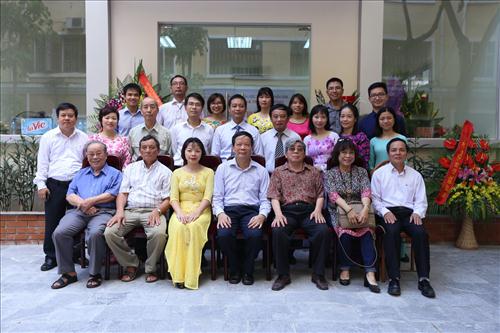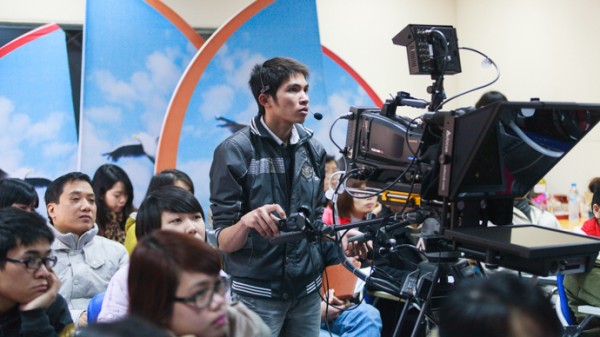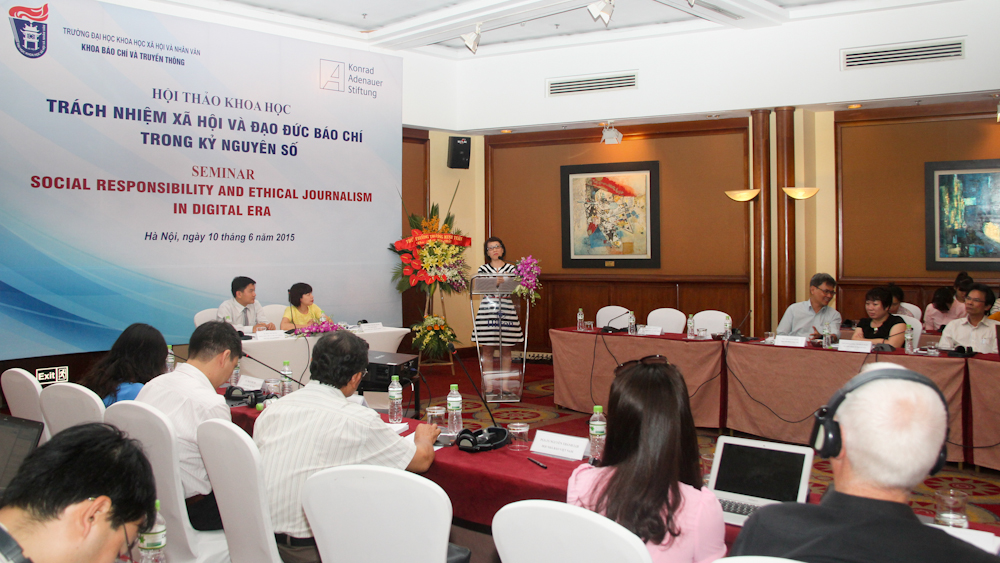
Sprouted from a great school of training and research in social sciences and humanities
In 1990, the Faculty of Journalism (now the Faculty of Journalism and Communication) was established, marking an important milestone for the first time, journalism training and research was placed in a university not in the Party school system, moreover, it is also the leading university in training and research in social sciences and humanities in Vietnam - Hanoi National University (now the University of Social Sciences and Humanities, VNU).
Since its inception, the Faculty has gathered a team of dedicated and enthusiastic staff and lecturers, many of whom are famous and prestigious scientists such as Prof. Ha Minh Duc, Assoc. Prof. Dr. Duong Xuan Son, Assoc. Prof. Dr. Dinh Van Huong, Assoc. Prof. Dr. Do Xuan Ha, Assoc. Prof. Dr. Vu Quang Hao, Assoc. Prof. Dr. Do Quang Hung, Assoc. Prof. Dr. Nguyen Thien Giap, Assoc. Prof. Dr. Doan Huong, Assoc. Prof. Dr. Nguyen Thi Minh Thai, Dr. Trinh Ho Khoa, etc.

Faculty of Journalism and Communication and School leaders
on Vietnam Press Day June 21
The academic knowledge and professional experience of the early professors and doctors laid a solid foundation for the existence and development of the Faculty, helping the Faculty to grow rapidly and soon assert its position in the field of Social Sciences and Humanities of VNU. Following the career of previous generations, the current teaching staff of the Faculty of Journalism and Communication are mostly young, dynamic and enthusiastic, 100% of the lecturers have a master's degree or higher, of which 29% of the faculty's teaching staff are associate professors, 43% have a PhD degree. Many staff have received professional training in the Soviet Union, UK, Australia, Korea, ... and are prestigious experts in academia, research and consulting on journalism and communication. In addition to the staff, the faculty also has more than 50 part-time lecturers and guest lecturers who are experts in journalism, journalism management, and many prestigious and experienced journalists.
Studying and working in the leading training and research environment of social sciences and humanities in Vietnam, students of the faculty are exposed to and imparted the most basic, fundamental and profound knowledge of philosophy, history, literature, linguistics, psychology, political science, etc. These are important and valuable knowledge bases that help future journalists write many articles that touch people's hearts with cultural depth and comprehensive social understanding.
Training innovation: Learner-centered, linking theory with practice
Currently, the Faculty of Journalism and Communication (University of Social Sciences and Humanities, VNU) is one of the two largest training and research institutions for journalism and communication in Vietnam, training 3 levels from bachelor to doctorate in Journalism; is the first institution to cooperate in training bachelors in journalism with Guangxi University (China), and is one of the first institutions to cooperate in training masters in "Media Management" with Stirling University (UK). The faculty is also the only faculty in Vietnam to train both majors: Journalism and Public Relations. The applied-oriented Master's program in Journalism that the faculty is waiting for approval will be the first Master's program in Journalism in Vietnam focusing on operational subjects and journalistic skills.

Richard Kilborn, professor at Stirling University (UK) discussed the topic "Participation Agreement - when the audience
as part of a TV show" with students of the Faculty of Journalism and Communication, June 2015
Since its establishment in 1990, the Faculty has trained more than 10,000 full-time and part-time bachelors, and more than 350 masters and doctors. Among them are thousands of reporters, editors, and media staff for many localities across the country, from Lao Cai, Yen Bai, Tuyen Quang, Thai Nguyen, Ha Nam, Thuong Tin, Thanh Hoa, Vinh, Ho Chi Minh City, ... to Ca Mau. More than 100 alumni of the Faculty have won national journalism awards and journalism awards of various sectors and levels. Many alumni of the Faculty are leaders or are holding important positions in press management agencies, press agencies from central to local levels, ...
The infrastructure work has also undergone many changes, effectively and practically serving the teaching and research of journalism and communication. The in-depth investment project to build a journalism and communication experimental training center, approved by the National University with a total investment of nearly 60 billion VND (phase 1 and 2), has helped the Faculty become a journalism and communication training facility with the most modern and synchronous training equipment system in Vietnam today. Many products are major assignments of students in operational subjects, broadcast and posted on mass media channels, many students of the Faculty have chosen to produce journalism products instead of writing their university graduation thesis. The gap between training and practice of journalism is gradually narrowing, theory is being more closely linked with practice when the Faculty of Journalism is a miniature editorial office. At the same time, this modern and synchronous infrastructure system is one of the important factors that helps the faculty affirm its training conditions and quality in the negotiation process for student exchange and recognition of training credits with the network of major journalism training schools in the region.
Professional research as the foundation for professional training
In addition to its training mission, the Faculty is also the leading center for journalism and communication research in the country with 02 State-level scientific research projects, 6 VNU-Hanoi-level projects, 1 Asia Foundation project and 3 school-level projects being implemented. In the past 5 years, more than 200 scientific articles of lecturers and staff have been published in scientific, theoretical and specialized journals, or reported at conferences at home and abroad.
Many domestic and international scientific conferences organized by the faculty in the past 5 years have attracted the attention and participation of hundreds of Vietnamese and foreign scientists, creating a buzz in the research community, and at the same time, providing many recommendations, solutions, and contributions to relevant agencies to manage and promote the improvement of the quality of journalism in Vietnam today, such as the conference "Media culture in the integration period, “Social Responsibility and Journalism Ethics in the Digital Age”, “Vietnamese and German economic journalism model”, “Social media, traditional media and public opinion”, 'Media management and information providers in the digital age”, “The role and impact of mass media culture on the public and Vietnamese society in the conditions of market economy and international integration”, “Working skills for industry newspapers”, “Participatory Discussion – When the Audience is Part of the TV Show" and "Legal issues in public relations activities”…

Students of the Faculty of Journalism and Communication in a practical class on television operations
with modern machinery and equipment system
The faculty has compiled 20 textbooks and 24 specialized lectures, nearly 30 monographs, and translated more than 15 documents on foreign press. These works systematically and methodically build on the core issues in research and practice of journalism and media in Vietnam today, effectively serving the training and policy consulting, in which many textbooks and monographs are not only bedside books for the faculty's students, but also handbooks for lecturers and students of many other schools.
Cooperation, integration and development
The Faculty of Journalism and Communication is a major hub for international exchange in journalism research and training in Vietnam, with partnerships with many major international press organizations.

Many cooperation projects with foreign countries have been implemented, typically the MediaPro Project - Building a framework for journalism training programs according to international standards (sponsored by the British Council), the Project to improve the capacity of young journalists (sponsored by the US Embassy)... The results of these cooperation projects are many monographs have been published, dozens of staff have been trained to improve their qualifications and teaching skills at home and abroad, the framework for journalism training programs has also been gradually revised and improved to suit the development trends of the world and Vietnam's media industry.
The Faculty of Journalism and Communication is gradually joining the network of 5 major journalism schools in the region, and in the near future the 5 schools will exchange students and recognize credits for professional training in each other's bachelor's degree programs. This is one of the steps for the Faculty to increasingly improve the quality of training to regional and international standards.
The profound lesson that brings about the success of the Faculty today is the spirit of solidarity, unanimity, and attachment of generations of teachers and students of the Faculty, the spirit of responsible, dedicated, dynamic, and effective work of the staff and lecturers, the efforts, seriousness, inquisitiveness, eagerness to learn, and creativity of the students and trainees of the Faculty of Journalism and Communication, and the joint efforts of many internal and external forces.
With the youthfulness of 25 years old full of ambition, the Faculty of Journalism and Communication will continue to promote internal strength and collective power, attract external resources to build and develop the Faculty in depth and in the direction of standardizing and modernizing all aspects of work in the common development of the University of Social Sciences and Humanities and Vietnam National University, Hanoi in the direction of a research university.

Collective of female staff of the Faculty of Journalism and Communication and the Center for Journalism and Communication Profession

Students of the Faculty of Journalism and Communication practice with modern equipment at the Center for Journalism and Communication.

Scientific Conference organized by the Faculty of Journalism and Communication, University of Social Sciences and Humanities, VNU in collaboration with KAS Institute (Germany) on June 10, 2015
Assoc.Prof.Dr. Dang Thi Thu Huong - Head of Faculty
Newer news
Older news